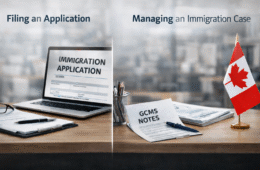
Top Reasons IRCC Refuses Spousal Sponsorship Applications
1. Failure to Prove a Genuine Relationship
The most common refusal stems from IRCC concluding that the relationship is not genuine or was entered into primarily for immigration purposes—per section 4(1) of the IRPR. Even if a relationship begins with such intent but later becomes genuine, IRCC now refuses these cases.
How to avoid this: Submit robust evidence including photos over time, communication logs, joint finances, travel records, and affidavits. Clearly outline the relationship’s development and context.
2. Insufficient Supporting Documentation
Weak or incomplete documentation—such as relying only on a marriage certificate or limited photos—can lead to refusal.
How to avoid: Provide comprehensive documents: statutory declarations, cohabitation/lease agreements, joint bank statements, communication records, and detailed explanations for any gaps.
3. Misrepresentation or Inconsistent Information
False statements or omissions—like not disclosing prior relationships, criminal history, or previous immigration violations—can lead to refusal under Section 40 IRPA and a possible 5-year ban.
How to avoid: Ensure consistency and accuracy across all past and current applications. If a Procedural Fairness Letter is issued, respond with full transparency and detailed evidence.
4. Financial Ineligibility of the Sponsor
While IRCC doesn’t require a specific minimum income for spousal sponsorships, they do expect financial stability and the ability to support the spouse without relying on public funds. Sponsor issues may include previous defaults, significant debt, or current social assistance.
How to avoid: Present recent pay stubs, tax documents, bank balances, letters of employment, and budgeting explanations for joint living.
5. Inadmissibility for the Sponsored Person
Applications may be refused if the sponsored person has criminal convictions or serious health issues posing a risk to Canada’s healthcare system.
How to avoid: Disclose all medical or criminal issues early on. For health-related inadmissibility, explore options like medical waivers or letters of explanation.
6. Sponsor Not Currently Residing in Canada
Canadian citizens residing outside Canada must provide clear plans proving their intent to return to Canada—like a job offer, lease, or children’s school enrollment. Permanent residents must actually live in Canada.
7. Lack of Evidence of Ongoing Contact
Long-distance couples must prove sustained communication. Sparse or static contact can raise doubts, especially in outland applications.
How to avoid: Upload detailed communication logs, ticket bookings, shared travel plans, and narrative explaining any periods of limited contact.
8. Inconsistent or Incomplete Applications
Errors like outdated forms, missing signatures, or contradictory entries across documents can lead to refusal or return.
How to avoid: Double-check every form, ensure everything is current and consistent, and follow IRCC checklists.
Real-World Perspectives & Risks
- Misrepresentation risks: Reddit users shared that IRCC may pursue sponsors if they suspect they knowingly entered into a marriage of convenience—even placing their permanent residency at risk.
- GCMS notes (ATIP requests): These internal IRCC records often clarify refusal reasoning, allowing you to strengthen future submissions.
What to Do Next: If You’ve Been Refused
Reapply
Use insights from refusal and GCMS notes to fix gaps: strengthen documentation, clarify inconsistencies, and address IRCC’s concerns fully.
Appeal to the Immigration Appeal Division (IAD)
For refusals based on bad-faith relationships under IRPR section 4, you may file a Notice of Appeal within 30 days. The process may include ADR and potentially a hearing.
Judicial Review
If procedural fairness or errors are evident, you can apply to the Federal Court of Canada for a judicial review. Deadlines: 15 days if inside Canada, 60 days if outside.
Summary Table
| Reason for Refusal | Description & Fixes |
|---|---|
| Genuine Relationship Doubts | Provide comprehensive photo, communication, and history evidence |
| Weak Supporting Documents | Use joint financial records, affidavits, and detailed narratives |
| Misrepresentation | Be truthful, consistent; respond professionally to PFL if issued |
| Sponsor Financial Weakness | Show income, bank statements, budgeting plan |
| Sponsored Person Inadmissibility | Disclose health/criminal issues early; consider waivers or explanations |
| Sponsor Residing Outside Canada | Show concrete plans to return (e.g. job, lease, family ties) |
| Poor Communication Evidence | Submit logs, tickets, explanations for periods of separation |
| Incomplete or Incorrect Forms | Ensure all forms up-to-date, signed, and verified against IRCC checklists |
Final Tips
- Request GCMS notes if already refused—they can reveal an officer’s precise concerns.
- Always explain cultural or relationship contexts (e.g. arranged marriages, long-distance timelines).
- If in doubt, consider professional legal guidance to help avoid a second refusal or more serious implications.








